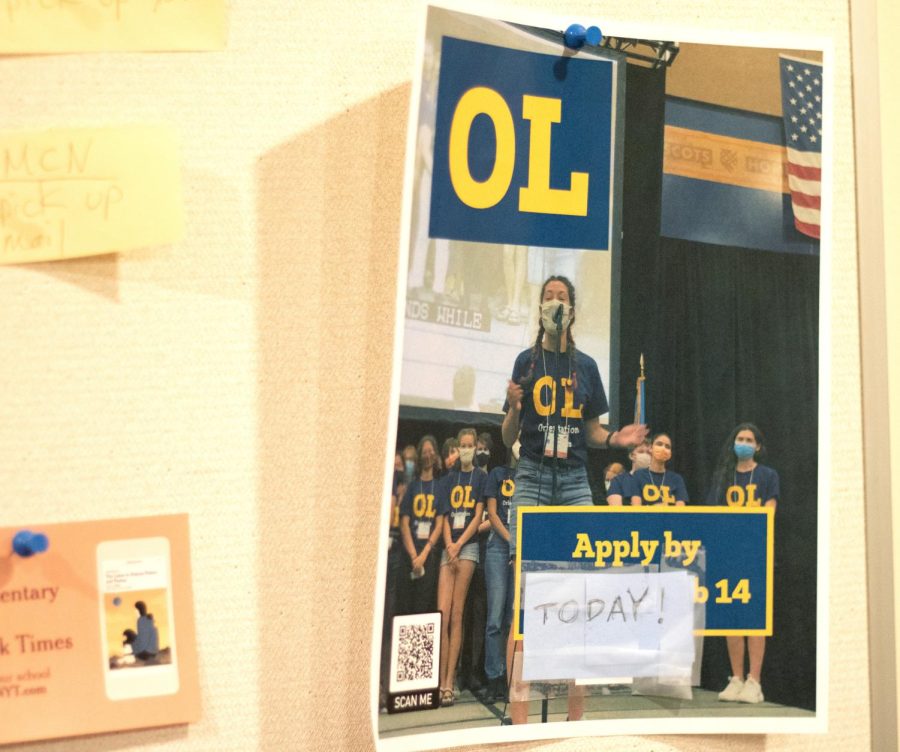Budget comittee considers Orientation Leaders’ call for pay
February 24, 2022
When Elise Sexton ’23 signed up to be an Orientation Leader (OL) this past fall, she was motivated to give incoming First Years a better orientation experience than her own.
“I hadn’t had a super great experience, so I was hoping that I could take some of that knowledge and give somebody else a better orientation experience than I had,” Sexton said.
After starting orientation training however, Sexton said she was surprised not only by the amount of work required of her, but that the work was also unpaid.
“I think every single person was shocked by how intense and draining it all ended up being,” Sexton said. “I don’t understand how you could get away with creating the concept of an OL and pitching that to the college and then selling it to the student body as unpaid–how did nobody stop that before it happened?”
Orientation Leaders are the primary student facilitators of First Year orientation, run through the Office of Student Leadership and Engagement (OSLE). Their role includes participating in four days of 9 a.m – 5 p.m training followed by five days of orientation during which they are responsible for assisting with First Year move-in, leading small groups and meeting one-on-one with students, among other tasks.
As the position stands, OL’s receive free meals from Cafe Mac valued at $23/day during the duration of the program, but no other financial compensation.
Ayana Smith-Kooiman ’22 who served as an OL during fall of 2020 and 2021 said that the job could be exhausting and that she remembered long days with few breaks.
“I was supposed to be in the Campus Center for two hours helping direct people for the Campus Center Extravaganza and I was like, I’m tired, let me go home. It’s 9:00 p.m.,” Smith-Kooiman said. “I think I slept on the floor of the Campus Center that day because I was like, I’m exhausted.”
Jacqueline Ong ’22, a 2021 OL, recalled a similarly tiring experience helping with move-in, something she didn’t expect to have to do when she signed up to be an OL.
“For some hours we were kept carrying students’ belongings from their cars up to to their rooms and it was very tiring, especially since I was not used to carrying heavy loads,” Ong wrote in an email to The Mac Weekly.
Teddy Holt ’22 served as an OL during fall 2019 and as an Orientation Coordinator (OC) in 2020 and 2021. Each year, three student OCs organize orientation training and serve as student mentors to OLs as part of a paid summer-long position. According to Holt, OLs get the opportunity to build relationships, a deeper understanding of the college and significant leadership experience, but the role can be demanding.
“It’s meaningful work, it feels good to do for a lot of people but it is hard labor,” Holt said. “You really are having to be in a room and be present and engaged for hours at a time with no financial compensation.”
This past fall, Director of OSLE Laurie Adamson, prepared a proposal for OSLE to receive funds in their operating budget to pay OLs. It was supported by Associate Vice President for Student Affairs and Dean of Students, Kathryn Kay Coquemont, and submitted to the Task Force on Budget (TFOB). TFOB is a committee of administrators who collect funding requests and send the following year’s budget recommendations to the senior leadership team, who make final allocation decisions for the board of trustees to review.
Margaret Smith, Coordinator of Leadership and Transition, oversees the OL hiring process and has worked with Adamson to run orientation. They said that Adamson had long pushed for an increase in the OSLE operating budget to pay OLs. Since starting at Mac in 2020, Smith has increased assessment and dialogue with former OLs that furthered the cause.
According to Smith, one of their primary motivations for requesting funding for OLs is that the lack of financial compensation could serve as a barrier for OL candidates without the means to work for free. Holt agreed with this sentiment and said that without paying OLs, the leadership cohort couldn’t accurately reflect the college.
“By not paying, you just miss out on so many people who need to make money during that time, and that’s not fair to them and it’s also not fair to our incoming students,” Holt said. “OL’s are representative of the Macalester community, but because we don’t pay them, they’re not actually representative of the Macalester community.”
Smith-Kooiman emphasized that keeping the OL position unpaid as it is now could have significant implications on the experience of First Years being introduced to Macalester.
“That’s knowledge that you’re losing out on, that’s perspective you’re losing out on if only the people who can afford to not be paid do the work. What type of perspectives are we giving students and what expectations are we bestowing?” Smith-Kooiman said. “I think it perpetuates a cycle of people not knowing the lived experiences and what other people have going on in their lives.”
According to Associate Dean of Students and TFOB representative for Student Affairs, Andrew Wells, senior leadership will receive the budget recommendations from TFOB in March, and next year’s finalized budget will be announced at some point before the end of the year depending on the length of their decision making.
Smith said that they hope to be able to notify next year’s cohort of OLs about whether the position will be paid before candidates have to choose whether to accept the offer in February and March.
According to Coquemont, TFOB is considering payment for OLs alongside a host of other budget requests, notably financial compensation for resident assistants (RA’s). She said she prioritizes the RA position receiving funding over the OLs given the difference in length of the roles.
“You might see one move forward before the other, or you could see both move forward or there might be reasons that one doesn’t move forward and that there’s no immediate plans to do that,” Coquemont said.
Coquemont expressed hope that funding for both positions would gain traction but encouraged students to be vocal about the issues that they view as most important.
“Every single thing that’s being asked for, it could be very important, but you can’t fund everything 100%. You can’t do that unless there’s something we’re willing to give up,” Coquemont said. “That’s the stuff where the student piece is really important. We want to know what their priorities are and we have to engage in that conversation of saying well where do we make room for this? Is there stuff that we’ve outgrown or we can stop doing?”
According to Smith, however, paying Orientation Leaders is just one piece of a broader issue of honoring students’ work.
“I’d love to see OLs obviously at some point get compensated, but I also think it would be great if Macalester had a more coordinated approach to leadership roles. Where do we draw the line on pay and not pay?” Smith said.
Coquemont, who has significant experience organizing orientation programs at higher education institutions, said that the issue fits into a general reckoning with how students are valued for their work.
“It is something that we’re seeing change in orientation across the country, not just at Macalester – but about roles that traditionally we have relied on people’s passion to do them, students are now asking for compensation and how we do that, how we fit that into the priorities of an institution is really important,” Coquemont said.
This past fall, MCSG members Katie McCarthy ’22 and Alex Ang ’22 formed an ad-hoc committee to focus on assessing unpaid student leadership positions, prompted by calls from RA’s for compensation. However, given low participation and little movement from the broader MCSG, the group hasn’t taken off.
While waiting to hear back from the budget committee, Smith said that they’ve tried to make the position description more transparent about what duties the OLs should expect to take on, based on feedback from former OL’s.
“I think that’s part of life, you try your best to advocate and then sometimes you might not get what you want, but you can make changes within your locus of control,” Smith said.
“I think that if you understand the time commitment and you’re still interested in it you should do it if that’s something that’s feasible for you,” Holt said “I believe that OL’s should be paid but also it’s not something that you’re just putting energy and effort into and not getting anything out of.”
However, according to Ong, the lack of financial compensation would discourage her from taking on the OL role if she had the choice again.
“It’s fun if you do it once because you really do get to meet cool new people, make some new friends and discover a lot of things about yourself and your values in the process,” Ong wrote. “But I would absolutely not do it again unless it was paid.”













